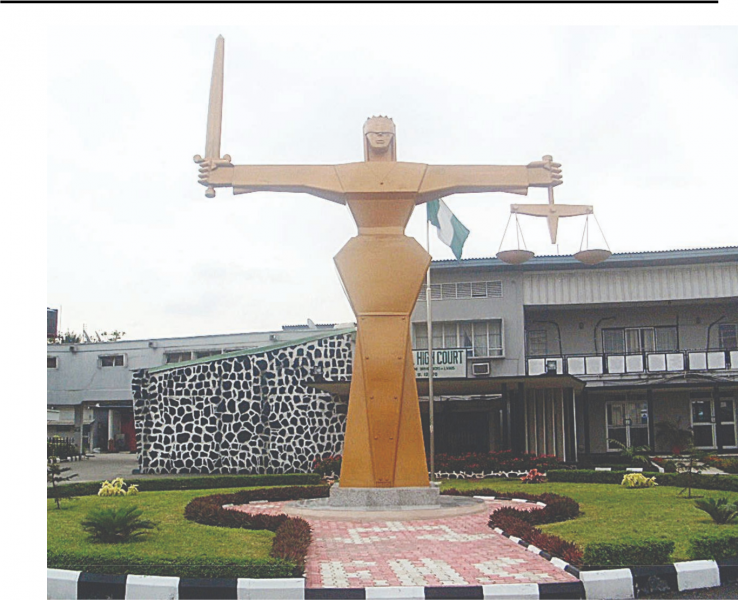
‘We do not see things as they are. We see them as we are,’ said Anais Nin, a famous American diarist. The manner in which the citizens of any nation adjudge their position with the law and its capability to produce well-deserved justice for everyone is as important as life and death.
It is no wonder then that the symbolic representation of Justice – the lady in blindfold – captures the essence of impartiality of reason and judgement in any collective existence. Indeed, the core elements of any good body of law is adjudged to include fairness and equity. The ‘naturally’ good law cannot be perceived as harmful or pernicious by society. It is for this reason that many comparative assessments of law and jurisprudential practices across the world fortify the assumption that justice is not only dispensed, but should be seen to be dispensed in record time.
This normative social reality is made possible because legal luminaries make it a point of duty to uphold and hold governments and leaders accountable to the principle of Social Contract, which is fundamental to peace and social development in any nation. Amartya Sen highlights the Demands of Justice to include reason and objectivity, social choice, and a relationship between institutions and persons which precludes partiality in any of its forms or ramifications. John Rawls himself had identified these factors in his own treatises on justice. Truly objective approaches to the law and to justice naturally and ‘technically’ ensures a foreclosure of partiality in the interest of engendering a just society.
Read Also: Justice Justifiable
When lawyers, and indeed Nigerian legal practitioners, speak of ‘miscarriage of justice’, they do so often in reference to an understanding that what emerges as an outcome in a court judgement, does not align with the logical and ideal expectations of the average unbiased watcher, participant or non-participant. According to Oxford’s Lexico, the idea of ‘miscarriage of justice’ also signposts a ‘failure of a court or judicial system to attain the ends of justice, especially one which results in the conviction of an innocent person.’ Essentially, it is usually an outcome in a court proceeding perceived as unacceptable in light of essential elements or ‘ingredients’ of a case. The Nigerian legal space is replete with illustrations that are at once distasteful and disappointing in this respect.
The Human Rights Watch, for instance, observed that Nigeria’s prosecution of suspected Boko Haram members has been so far marred by serious judicial shortcomings. According to the group, government has failed to give priority to the prosecution of key actors, such as people that were most responsible for fuelling Boko Haram’s killings and other atrocious acts. While some of the suspects had been apprehended and detained since 2009, trial only commenced in 2017. While many of the 1,669 suspects prosecuted until now were charged with providing material and non-violent support to the group, it is astonishing that the victims of brutal attacks in various communities in Borno are completely excluded from observing and testifying in the court proceedings.
The May 2020 Supreme Court judgement which nullified the conviction of Orji Uzor Kalu, former Governor of Abia State, is illustrative of how the Nigerian judiciary uses technical elements to undermine the idea of justice. Early in December 2019, the Federal High Court in Lagos had convicted the former governor and an accomplice over the looting of N7.65billion. At a time when many Nigerians believed the two were already serving their time, which was to be between 10 and 12 years in prison, the rude shock came as the Supreme Court nullified the ruling of the High Court. The reason adduced was that the authorisation given to the sitting High Court judge, Justice Mohammed Idris, who proceeded to conclude the case, had counted only as a nullity, given that the judge was already elevated to the Court of Appeal before the ruling took place. It becomes more interesting that this court verdict took at least seven years in coming.
With these and other similar scenarios that colour the Nigerian legal landscape, the Nigerian judiciary pitches itself in a direction that is antithetical to an idea of justice, the eradication of corruption, and the establishment of a fair and just society. There is a culture of partiality which favours the political class across the country, while ordinary citizens face the full wrath of the law in similar situations, and other cases that bear little weight. The Nigerian society is being propelled on changing principles of justice that offer advantages and disadvantages to different sets of persons and groups in similar legal situations.
While judicial outcomes of cases in the nation’s courts have become more relative and without consistency in their recourse to principles and rules, a very troubling situation today is that of justice delayed. People go to court to seek redress for one perceived injustice or the other, and remain in court until they die, or until the redress they seek, if it ever comes, has lost its value. This is the greatest injustice being perpetrated and perpetuated by the nation’s judicial system, and the judges and lawyers help one another to make it so. Wittingly and unwittingly, they collude with criminally-minded people who use “delay tactics” to deny justice to citizens in various civil and criminal matters. The average lifespan of court cases in Nigeria today is 12-15 years. This is a travesty of justice, and the judges, court registrars and lawyers cannot exonerate themselves, not under any circumstance. The beneficiaries of this mockery are the judges, the registrars, the lawyers, and the guilty parties, criminals included.
Read Also: A2Justice Accuse Buhari of ethnic Bias in Appointing Supreme Court Judges
The judges and registrars continue to earn their living from tax-payers monies for services not rendered or poorly delivered. The lawyers often create and exploit the situation and continue to live off their clients as long as a matter is in court. For many guilty parties and criminals, a core objective and strategy is for a matter to be stalled in court, and to all intents and purposes, that judges and lawyers are on their side. Invariably, the Nigerian judicial system as presently constituted is designed to rewards criminals and punish law-abiding citizens.
Until a few years ago, persons with stolen electoral mandates were sworn in as state governors and were in office for two to three years before the courts eventually threw them out. All they needed to do was ensure, with the collaboration or connivance of the judges and lawyers, that the matter remained in court till almost the end of their tenure. And they always had their way. That situation has changed a bit in the political sphere, but it has not in any other. The nation and her citizens are still under the chokehold of judges, lawyers, and people that would rather have justice not served, or delayed long enough to enable them to continue to enjoy the benefits of their criminality.
There is so much that is wrong with the Nigerian Judiciary and the dispensation of justice. Why should citizens go to court to seek justice, and they spend more at the end of the day than the value of the redress they seek or get? Thousands of Nigerians have died while in court and the justice they wanted never came after many years of expending a lot more resources in the process. Double wahala for dead body, ala Fela Anikulapo Kuti. Many of them could have died of despair with the justice system. Why are criminals in Nigeria comfortable with the justice system? Many of them believe it can be manipulated, and they do manipulate it.
The Nigerian judicial system is in dire need of reformation, and it behoves the Federal Government and all concerned parties to quickly and critically look in this direction if Nigeria must become a nation of truth, fairness and equity. The judiciary today is not a bastion of hope for the common man; many have died with hope buried in their chests, and many continue to live in despair because of justice delayed and denied. Nigeria is in need a responsive judiciary that is a true bastion of hope for citizens on the right side of the law.

Udu Yakubu
